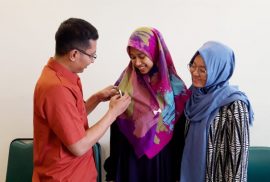- MAK Sahide, S Supratman, A Maryudi, Y-S Kim, L Giessen. 2016. Decentralisation Policy as Recentralisation Strategy: Forest Management Units and Community Forestry in Indonesia. International Forestry Review 18 (1): 78-95. https://doi.org/10.1505/146554816818206168
Abstract
Critical political analyses on decentralisation policies have revealed that such approaches may not achieve their formal goal, and might even support centralisation efforts. A number of previous studies on decentralisation separated the analyses of administrative process from the analyses of political power of administrative actors across levels of government. Using bureaucratic politics theory, this article presents close examinations of both process and power relations reconfigured



 Ketua Sebijak Institute secara resmi menerima Dwi Laraswati dan Sari Rahayu
Ketua Sebijak Institute secara resmi menerima Dwi Laraswati dan Sari Rahayu
